Self-Inflating Tires…Soon To Be A Reality?
Driving around on underinflated tires is just a bad idea all the way around. Underinflated tires increase a car’s rolling resistance, meaning a drop in fuel efficiency since it takes more energy to move the vehicle down the road.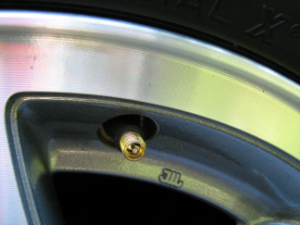
A single tire that’s down by ten pounds of air means a 3.3 percent drop in fuel economy…multiply that by all four tires, and you can figure on giving up ten percent of your gas mileage. The added friction and rolling resistance also means more heat is generated, and heat is the enemy of the internal structure of a tire. That heat will damage a tire to the point of failure. Studies show that underinflated tires are a full 25 percent more likely to fail, and at least half of one-car accidents involve a tire problem as a factor. And still, it’s estimated ...[more]
Don’t Let Tire Problems Put the Brakes on Your Valentine’s Date
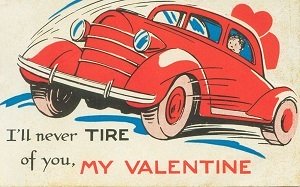 Don’t let tire problems get in the way this Valentine’s day. How is your tire pressure? Do my tires need to be rotated? Is it time for an alignment? Do I need new tires? While these questions can seem daunting, with the help of tire professionals and various routine self-checks, any driver can maintain proper tire care and not miss that big date this Valentine’s Day. From tire rotations to air pressure, learning what signals might indicate tire replacement or repair is important for every vehicle owner.
Don’t let tire problems get in the way this Valentine’s day. How is your tire pressure? Do my tires need to be rotated? Is it time for an alignment? Do I need new tires? While these questions can seem daunting, with the help of tire professionals and various routine self-checks, any driver can maintain proper tire care and not miss that big date this Valentine’s Day. From tire rotations to air pressure, learning what signals might indicate tire replacement or repair is important for every vehicle owner. Five Tips for Thanksgiving Travel
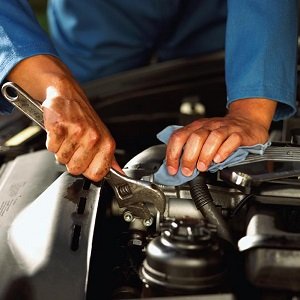 1. Tires: Ensure tire pressure is properly serviced and maintained for both lengthy travels and everyday driving. Underinflation of tires can cause unnecessary wear and hardship to tire tread, causing tire failure or malfunctions. If not properly inflated, fuel economy can be severely decreased, causing drivers to lose about .6 miles per gallon due to improper tire conditions. Whether over or under inflated, tires can easily lose traction that could lead to an accident if not addressed. Service tires before Thanksgiving travel this holiday season to avoid unnecessary accidents, injury or inconvenience.
1. Tires: Ensure tire pressure is properly serviced and maintained for both lengthy travels and everyday driving. Underinflation of tires can cause unnecessary wear and hardship to tire tread, causing tire failure or malfunctions. If not properly inflated, fuel economy can be severely decreased, causing drivers to lose about .6 miles per gallon due to improper tire conditions. Whether over or under inflated, tires can easily lose traction that could lead to an accident if not addressed. Service tires before Thanksgiving travel this holiday season to avoid unnecessary accidents, injury or inconvenience.How to Avoid Tire Blowouts
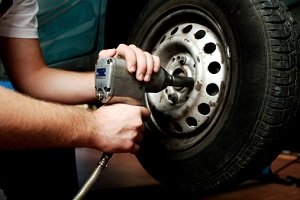 Through proper care and treatment of tires, serious or fatal accidents caused by blowouts are highly preventable if proper precautions are taken. Because tire blowouts can develop from many situations, drivers should strive to be aware of tire conditions and schedule professional check-ups accordingly. This is especially true during transitional weather periods. Take particular care to examine tire conditions as quickly changing temperatures can cause weak tires to fail.
Through proper care and treatment of tires, serious or fatal accidents caused by blowouts are highly preventable if proper precautions are taken. Because tire blowouts can develop from many situations, drivers should strive to be aware of tire conditions and schedule professional check-ups accordingly. This is especially true during transitional weather periods. Take particular care to examine tire conditions as quickly changing temperatures can cause weak tires to fail.Is it Time for a Tire Rotation?
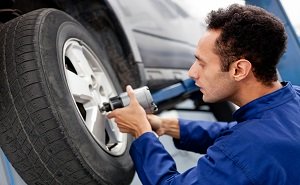 Tire rotation is an easy maintenance item that has long term benefits for any vehicle. When properly maintained, tire rotations can improve fuel economy, extend tire life and provide drivers better handling through improved stability. Frequently servicing vehicles with tire rotations is imperative to sustaining tire tread by ensuring all tires are used evenly without excessive wear to one section or another.
Tire rotation is an easy maintenance item that has long term benefits for any vehicle. When properly maintained, tire rotations can improve fuel economy, extend tire life and provide drivers better handling through improved stability. Frequently servicing vehicles with tire rotations is imperative to sustaining tire tread by ensuring all tires are used evenly without excessive wear to one section or another.
Normal tread wear is unavoidable due to uneven vehicle weight dispersal, vehicle performance, etc. Without tire rotations, tires continue to wear on the same areas over and over, causing irreversible damage to tire tread which drastically decreases tire life. Engine weight accounts for a major portion of vehicle weight, causing front tires to wear significantly faster than back tires. Front tires ...[more]
